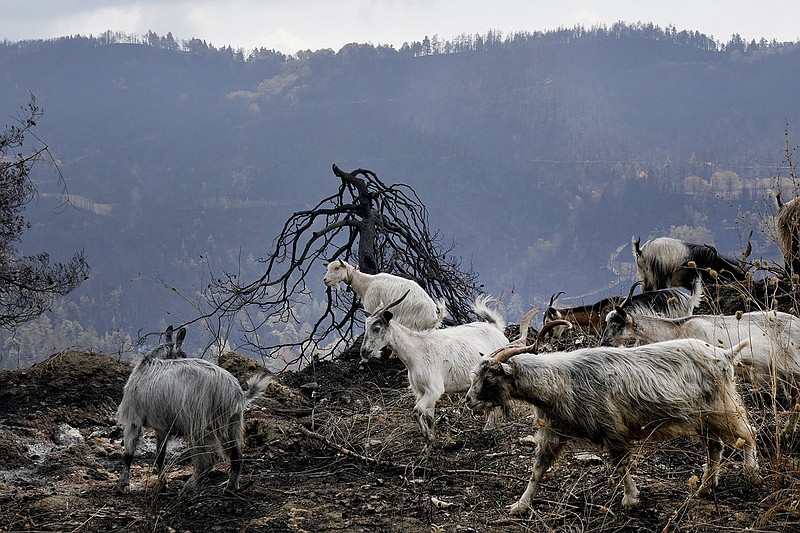ATHENS, Greece -- Greek Prime Minister Kyriakos Mitsotakis on Thursday described the devastating wildfires that burned across the country for more than a week as the greatest ecological catastrophe Greece had seen in decades.
The fires broke out as the country roasted during the most intense and protracted heat wave experienced since 1987. Hundreds of wildfires started across the country, stretching Greece's firefighting capabilities to the limit and leading the government to appeal for help from abroad. Hundreds of firefighters, along with planes, helicopters and vehicles, arrived from 24 European and Middle Eastern countries to assist.
"We managed to save lives, but we lost forests and property," Mitsotakis said, describing the wildfires as "the greatest ecological catastrophe of the last few decades."
Speaking during a news conference in Athens, his first since the fires broke out, Mitsotakis said authorities had faced around 100 active blazes each day. By Thursday, the situation was much improved, with most large wildfires on the wane.
But the prime minister warned the danger of more blazes was still present.
[Video not showing up above? Click here to watch ª arkansasonline.com/813greek/]
"We are in the middle of August, and it's clear we will have difficult days ahead of us" until the season during which fires usually break out is over, he said.
"The climate crisis -- I'd like to use this term, and not climate change -- the climate crisis is here, and it shows us everything needs to change" he said, adding he was ready to make the "bold changes" needed.
"This is a common crisis for all of us," he said.
Several Mediterranean countries have suffered intense heat and quickly spreading wildfires in recent weeks, including Turkey, where at least eight people have died, and Italy. In Algeria, wildfires in the mountains have killed at least 69 people.
Worsening drought and heat -- both linked to climate change -- have also fueled wildfires this summer in the Western U.S. and in Russia's northern Siberia region. Scientists say there is little doubt that climate change from the burning of coal, oil and natural gas is driving more extreme events.
Greece's largest fire broke out on the country's second-largest island of Evia on Aug. 3 and was still smoldering on Thursday, after having destroyed most of the island's north.
More than 50,900 hectares were damaged in northern Evia, according to mapping from the European Union's Copernicus Emergency Management Service. Entire mountains of mainly pine forest have been reduced to wastelands of blackened stumps, while olive and fig tree plantations and vineyards were also destroyed.
More than 850 firefighters, including hundreds from the Ukraine, Romania, Serbia, Slovakia, Poland and Moldova, were continuing efforts to prevent flare-ups in the area, assisted by nine helicopters and eight aircraft, including two massive Ilyushin 11-76 water-dropping planes sent by Russia.
Two major fires were also still burning in the southern Greek region of the Peloponnese, while the fire department said Thursday evening that 106 blazes had broken out across Greece in the previous 24 hours.
The government prioritized protecting lives in its fire response, issuing dozens of evacuation orders for villages in the path of the flames. In that respect, the policy appears to have worked. One volunteer firefighter died while working in an area north of Athens after being hit by a falling electricity pole. Four volunteer firefighters have been hospitalized with burns, including two in critical condition in intensive care.
Greek authorities had been anxious to avoid a repetition of the summer of 2018, when a fast-moving wildfire engulfed a seaside settlement near Athens, killing more than 100 people, including some who drowned trying to escape by sea.
But the current tactic of evacuation orders has come under criticism by many residents and local officials in areas affected by this year's fires, who have argued the orders were premature. They point to those who ignored the evacuation messages, staying behind to fight the flames and managing to save their homes.
"We managed to protect thousands of people. But we lost forests and property," Mitsotakis said during his news conference. "And we are here to talk about everything ... [including] where nature found us unprepared."

